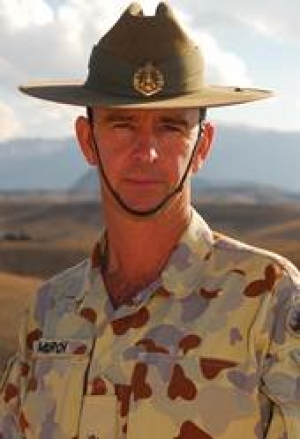In 1992, he was posted to Depot Company, Royal Australian Regiment as an instructor for initial employment trainees and in January 1995 was promoted to sergeant and posted to the 6th Battalion, Royal Australian Regiment as a Rifle Platoon Sergeant and the Reconnaissance Platoon Sergeant. In 1998, he was posted to Battle Wing Tully, Land Command Battle School, as a Jungle Warfare Instructor.
In 2000, Warrant Officer Murch was promoted to Warrant Officer Class Two and posted to the 12th/40th Battalion, Royal Tasmania Regiment and fulfilled appointments as a Company Sergeant Major and Operations Warrant Officer. At the completion of his tenure in Tasmania, he was posted to the 5th/7th Battalion, Royal Australian Regiment and served for two years fulfilling appointments as the Operations Warrant Officer and a Company Sergeant Major. During 2002/03 he deployed with AUSBAT VII on Operation Citadel to East Timor.
In January 2004, Warrant Officer Murch was posted to the Regional Training Centre – South Queensland and served as the Course Sergeant Major for Subject One Corporal. In 2006, he was posted to Headquarters 1st Division/Deployable Joint Forces Headquarters as the Operations Warrant Officer.
He was promoted to Warrant Officer Class One in December 2006 and posted to the 8th/7th Battalion, Royal Victoria Regiment as the Regimental Sergeant Major. During 2009/10 Warrant Officer Murch served as the Regimental Sergeant Major of the 1st Battalion, Royal Australian Regiment and deployed as the RSM of Mentoring and Reconstruction Task Force Two on Operation Slipper to Afghanistan. He was awarded the Medal of the Order of Australia in the 2012 Australia Day Honours List.
He is currently the Regimental Sergeant Major of the School of Infantry.
Warrant Officer Murch is married to Theresa and together have three children, Jack, Tasman and Parker.
Serving in the Australian Army has allowed me to work alongside thousands of officers and soldiers and many of those have deployed on operations. Everyone who goes on active service comes home a different person and it is the support of family, leaders, mates and support organisations such as AFOM that supports reintegration into “normal” life.
AFOM aims to enable research and education into the field of military families. This is a broad mandate that covers the impacts of deployments, health and well being, scientific and post graduate research and providing information to influence the development of Government policy.
I have great admiration for the Directors and Supporters of AFOM, all of who contribute significantly to the needs of military families. It isn’t always the up front support that helps the most but often it is the foundational work that provides the path to success and AFOM certainly does this.




